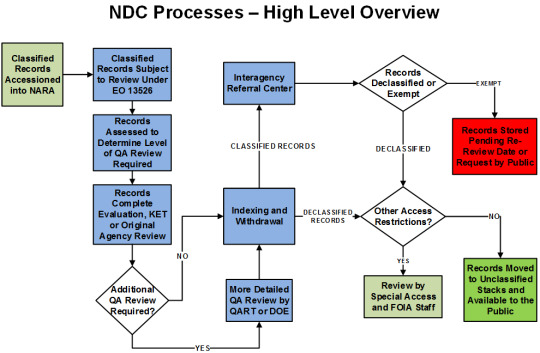#overclassification
Explore tagged Tumblr posts
Text

The Roswell Daily Record knows what’s up.
Link: https://www.rdrnews.com/opinion/columnists/the-senate-s-intelligence-committee-should-investigate-the-pentagon-s-overclassification-of-uap/article_ac642c9a-4551-11ef-aa95-3709a1df1519.html
12 notes
·
View notes
Text
This day in history

There are only THREE MORE DAYS left in my Kickstarter for the audiobook of The Bezzle, the sequel to Red Team Blues, narrated by @wilwheaton! You can pre-order the audiobook and ebook, DRM free, as well as the hardcover, signed or unsigned. There's also bundles with Red Team Blues in ebook, audio or paperback.

#20yrsago First corporate sponsorship for an MMORPG guild https://web.archive.org/web/20040426073811/https://www.warcry.com/scripts/columns/view_sectionalt.phtml?site=15&id=108&colid=1675
#20yrsago More non-evil social network ideas https://web.archive.org/web/20040217043710/http://www.ambiguous.org/archive.php3/2004/01/30#quinn2004130.1
#20yrsago When spam-filters attack https://web.archive.org/web/20040529003653/https://www.oblomovka.com/entries/2004/01/30#1075490400
#20yrsago Mobile interface myths https://web.archive.org/web/20040205050015/https://www.acm.org/chapters/chi-sqrd/meetings/20040310.html
#20yrsago Totalitarian trusted computing https://web.archive.org/web/20040205084716/http://costik.com/weblog/2004_01_01_blogchive.html#107547544736650899
#10yrsago Rob Ford sued for jailhouse beating of his ex-brother-in-law https://www.theglobeandmail.com/news/toronto/brother-in-law-abused-in-jail-to-keep-quiet-about-rob-fords-drug-use-lawsuit-alleges/article16590910/
#10yrsago Finally, a legal challenge to US warrantless wiretapping that beats the Catch-22 https://arstechnica.com/tech-policy/2014/01/in-rare-move-terrorism-suspect-challenges-core-of-warrentless-snooping-law/
#10yrsago Detailed timeline of the Bletchley Park mess https://freelance.halfacree.co.uk/2014/01/disharmony-at-bletchley-park/
#10yrsago Key 3D printing patent expired yesterday https://3dprint.com/387/laser-sintering-3d-printing-may-now-take-off-with-a-very-important-patent-expiring-today/
#10yrsago NSA phone-records spying is totally, utterly illegal https://www.techdirt.com/2014/01/28/almost-everything-about-bulk-collection-phone-data-is-illegal/
#10yrsago North Carolina’s Lake Norman Regional Medical Center charges patient $81,000 for $750 worth of snakebite medicine https://www.christianpost.com/news/hospital-charges-snake-bitten-man-81k-for-anti-venom-available-online-for-750-after-18-hour-stay.html
#5yrsago American prisoners coerced or tricked into providing voice-prints for use in eternal, secret, unchecked surveillance https://theintercept.com/2019/01/30/prison-voice-prints-databases-securus/
#5yrsago After $4.1 billion subsidy, Foxconn cancels plan to build Wisconsin “factory,” now proposing a small R&D facility https://www.theverge.com/2019/1/30/18203442/foxconn-wisconsin-lcd-factory-over-jobs-louis-woo
#5yrsago Facebook cancels its all-spying, secret “research” program, Apple cancels Facebook’s developer account https://www.theverge.com/facebook/2019/1/30/18203349/facebook-research-app-apple-shutdown
#5yrsago Blackmailers use false copyright claims to shut down victims’ Youtube accounts, offer to lift them in exchange for Bitcoin https://torrentfreak.com/youtube-strikes-now-being-used-as-scammers-extortion-tool/
#5yrsago Conducting “evil” computer research, in the name of good https://chi4evil.wordpress.com
#5yrsago Discarded smart lightbulbs reveal your wifi passwords, stored in the clear https://limitedresults.com/2019/01/pwn-the-lifx-mini-white/
#5yrsago Project Atlas: Facebook has been secretly paying Iphone users to install an all-surveilling “VPN” app https://techcrunch.com/2019/01/29/facebook-project-atlas/
#1yrago The real scandal is overclassification https://pluralistic.net/2023/01/30/i-come-to-a-land-downunder/#but-id-have-to-kill-you

Berliners: Otherland has added a second date (Jan 28 - TONIGHT) for my book-talk after the first one sold out - book now!


Back the Kickstarter for the audiobook of The Bezzle here!
5 notes
·
View notes
Text
Archivists on the Issues: Classified Records, Archives, and Fictional Depictions [Part 1]
Archivists on the Issues is a forum for archivists to discuss the issues we are facing today. Today’s post comes from Burkely Hermann (me), Metadata Librarian for the National Security Archive and current I&A Blog Coordinator. There will be spoilers for each of the books, animated series, films, and other media he will be discussing. This was originally published on February 7, 2023 on the Issues & Advocacy WordPress blog.

High-level overview of National Declassification Center processes, as shown in a post on the NDC blog in 2019
Previously on this blog, Rachel Mattson examined whether police body camera footage is public record or is classified, arguing that it should be a public record. Other blogposts on this blog have examined whether the Senate Intelligence Committee Report on Torture is a Federal or Congressional Record, noted selective declassification by the French government, which declassified over 200,000 records about Vichy government’s collaboration with the Nazis but none about France's occupation of Algeria, and noted the tendency of politicians to avoid documenting their activities and stonewall FOIA requests.
In January 2022, the Director of National Intelligence April Haines argued, in a letter to U.S. Senators Ron Wyden and Jerry Moran that there are "deficiencies" in the current declassification system, and notes the burden of mandatory declassification requirements while the amount of classified material expands. My colleague from National Security Archive, Lauren Harper, noted that Haines, many months later, said that overclassification is a national security threat. Some of these classified records are in the hands of the National Archives, otherwise known as the National Archives and Records Administration (NARA), organized into Top Secret, Secret, and Confidential. Other records are deemed unclassified if they do not meet the existing requirements for classification.
Classification of records in the U.S. has often been outlined in presidential executive orders, beginning with President Truman in 1951. National security generally described as the primary reason for classification. Over the years, rules changed and the role of NARA increased. This has even resulted in a part of the agency dedicated to declassification, the National Declassification Center (NDC), which was established in 2009, in accordance with Executive Order 13526. This went beyond the agency's representation on the Interagency Security Classification Appeals Panel (ISCAP), or the Information Security Oversight Office (ISOO), which oversees the security classification programs in "both Government and industry", and reports to the President annually. The ISOO, role on ISCAP, and NDC, most recently, have given NARA an important position in the entire classified information management process. [1]
Unsurprisingly, NARA has been in the public focus, especially for storing presidential records from the Obama Administration, and afterward. Some politicians have claimed the agency is an "enemy" and have wanted to dismantle it because of NARA's push to return classified records to the public, rather than having the records stored in shoddy locations or controlled by presidents as their personal property. [2] This makes reports, in past years, like in May 2012, that boxes of classified government records disappeared from Washington National Records Center all the more concerning, as it could be representative of a larger trend.
Currently, there are measures in place for declassification of government records, either enshrined in executive orders or provisions of the Freedom of Information Act (FOIA). However, the FOIA system is currently flawed, especially with existence of various exemptions which can be used to redact documents or reject records requests. [3] There are similar issues with Mandatory Declassification Review (MDR) requests. As one government report put it, storage of classified materials is "widespread" across the U.S. government, with NARA storing records from all agencies at central facilities. Even so, some have argued that politicians have neglected the National Archives and failed to "control official secrecy", belaying assumptions about government transparency, and resulting in the crisis which will make it harder for researchers to examine the "state’s inner workings". Recent developments, such as a drop in the annual budget of NARA, attrition, and loss of institutional memory have resulted in the agency having one of the lowest levels of job satisfaction in the federal government. All the while, funding for declassification has decreased and backlogs for declassification have increased. [4]
NARA is not the only archives which handles and processes classified records. There are established procedures for classification of records held by the New South Wales Archives in Australia, British Public Record Office, Taiwanese government, Israeli Defense Force, State Archives of Poland, National Archives of Brazil, South African State Archives Service (later renamed National Archives and Records Service), National Archives of Korea, and National Archives of France. Even the archives of the United Nations has a classification level of Strictly Confidential, necessitating declassification requests, while archival materials over 20 years old are "generally open to the public for research". [5]
As Electronic Records Archivist Amy Wickner argued, archivists have the "power to name and classify," a power which has "material effects on the world". This power can be used to make records more accessible or to make them harder to access. The latter is the case if access is only "granted or refused on an individual basis". At times, more restrictions are imposed because of compliance with professional standards or data within in a record rather than the document itself. This includes including personal data. On the other hand, records which should be publicly available, like agreements between carceral facilities and FamilySearch for indexing of historical records, have a possibility of redaction, despite the lack of personal or sensitive information. [6]
© 2022-2023 Burkely Hermann. All rights reserved.
Continued in part 2
Notes
[1] Čtvrtník, Mikuláš. "Classified records and the archives." Archival Science 22 (2022): https://doi.org/10.1007/s10502-021-09370-3.
[2] O'Rourke, Ciara. "Claims about Obama Foundation keeping classified records in an abandoned warehouse are wrong." Poynter, Oct. 7, 2022; Caputo, Marc. "Barr suggests Trump 'deceived' the government over classified records." NBC News, Sept. 2, 2022; Suebsaeng, Asawin and Adam Rawnsley. "Trump Tells His Lawyers: Get ‘My’ Top Secret Documents Back." Rolling Stone, Aug. 23, 2022; Alemany, Jacqueline, Isaac Arnsdorf, and Josh Dawsey. "Inside Trump’s war on the National Archives." Washington Post, Aug. 27, 2022; Legare, Robert. "Archives found 100+ documents with classified marking in first 15 Trump boxes." Yahoo! News, CBS News. Aug. 23, 2022; Kochi, Sudiksha. "Fact check: Archives agency transferred 30 million unclassified Obama records to Chicago." USA Today, Oct. 3, 2022; Derysh, Igor. "'He has the right to remain silent': Legal experts say Trump’s Truth Social post may be 'evidence'." Salon, Nov. 29, 2022; "Press Statements in Response to Media Queries About Presidential Records." National Archives and Records Administration, Nov. 9, 2022; Reilly, Steve. "What the government’s former top classified records overseer sees in the Mar-a-Lago search." Grid, Aug. 10, 2022; Wood, Jennifer. "Donald Trump Just Couldn’t Keep His Mouth Shut And Went Ahead And Confessed: ‘I Did’ Steal Classified Documents From The White House." Uproxx, Nov. 29, 2022; "Fact Check-National Archives and Records Administration says they manage all of Obama’s Presidential records, contrary to claims online." Reuters, Sept. 30, 2022. There have also been cases, like a lawsuit by the conservative legal group, Judicial Watch, against NARA, aiming to declassify Clinton Administration efforts, but their efforts were dismissed by the courts.
[3] "Freedom of Information Act flaws need fixing, experts say." American Bar Association, Aug. 4, 2018; "The media’s problems with FOIA." Reporter's Committee for Freedom of the Press, Winter 2007; Goos, Christian. "Seeking Access to Classified Records: Requesting Mandatory Declassification Review (MDR) versus Freedom of Information Act (FOIA)." ISOO Overview, Oct. 1, 2021.Also of note are pages like the "Overview" webpage on the Records Management Directorate and Army Declassification Directorate, the NSA's page on supposed declassification/transparency initiatives, and a press release about ZL Tech's support of a "records management platform with DOD classified technology".
[4] "Appendix V: Central Storage, Declassification and Destruction" in Classified Information: Costs of Protection are Integrated with Other Security Costs: Report to the Chairman, Information, Justice, Transportation, and Agriculture Subcommittee, Committee on Government Operations, House of Representatives (United States General Accounting Office, 1993), 26; Connelly, Matthew. "State Secrecy, Archival Negligence, and the End of History as We Know It." Knight First Amendment Institute, Sept. 21, 2018. The latter article also says that state secrecy and state archiving began at the same time, around the establishment of NARA and into World War II.
[5] "Standard on the physical storage of State records." New South Wales Archives in Australia, Feb. 2019; Wittner, Laurence. "What I Learned About Governments from Researching Classified Documents." History News Network, Sept. 4, 2022; "The Management Regulations for Classified Archives." Law & Regulations Database of the Republic of China (Taiwan), May 10, 2005; Peterson, Terrence. "The French Archives and the Coming Fight for Declassification." War on the Rocks, Mar. 6, 2020; Makleff, Ron. "Sovereignty and Silence: The Creation of a Myth of Archival Destruction, Liège, 1408." Archive Journal, Aug. 2017; "Public Reference Services." United Nations Archives and Records Management Section, accessed Dec. 5, 2022; Franco, Shirley. "Transparência e opacidade do estado no Brasil: Usos e desusos da informação governamental." The American Archivist 84, no. 1 (2021): 196; Sromek, Teresa. "Teoria i praktyka archiwistyki USA." The American Archivist 83, no. 1 (2020): 177; Harris, Verne and Christopher Merrett. "Toward a Culture of Transparency: Public Rights of Access to Official Records in South Africa." The American Archivist 57, no. 4 (1994): 681-2, 684, 688, 691; Lee, Kyong. "Political Democracy and Archival Development in the Management of Presidential Records in the Republic of Korea." The American Archivist 69, no. 1 (2006): 119-120,129, 134-135, 137-138.
[6] Wickner, Amy. "Recognizing Co-Creators in Four Configurations: Critical Questions for Web Archiving." Journal of Contemporary Archival Studies 8 (2019): 4; Geraci, Noah and Michelle Caswell. "Developing a Typology of Human Rights Records." Journal of Contemporary Archival Studies 3 (2016): 18; Taylor, Claire, Lucia Brandi, Cecilia A. Acosta Sánchez, and Marcelo Díaz Vallejo, "Archives of Human Rights and Historical Memory: An Analysis of Archival Practices ‘From Below’ in Four NGOs in Colombia Archival Practices ‘From Below’ in Four NGOs in Colombia." Journal of Contemporary Archival Studies 8 (2021): 11, 16; Rinn, Meghan R. "Review of The Future of Literary Archives." Journal of Contemporary Archival Studies 7 (2020): 4; Szekely, Ivan. "Do Archives Have a Future in the Digital Age?" Journal of Contemporary Archival Studies 4 (2017): 4; Jansson, Jenny, Katrin Uba, Jaanus Karo, "Labor Gone Digital (DigiFacket)! Experiences from Creating a Web Archive for Swedish Trade UnionsArchive for Swedish Trade Unions." Journal of Contemporary Archival Studies 7 (2020): 5; Windon, Katrina and Lydia M. Tang. "Archival discretion: a survey on the theory and practice of archival restrictions." Journal of Contemporary Archival Studies 9 (2022): 8.
#archival science#archival studies#archives#familysearch#genealogy#classification#classified records#declassified#nara#national archives#foia#freedom of information#mdr requests#president truman#prisons#records center#obama library#trump library#anti trump
3 notes
·
View notes
Text
Trump vows to release JFK, RFK, MLK assassination records in 'coming days'
(The Hill) — President-elect Donald Trump on Sunday vowed to release records related to former President John F. Kennedy, Robert F. Kennedy and Martin Luther King Jr.’s assassinations “in the coming days.” “As a first step toward restoring transparency and accountability to government, we will also reverse the overclassification of government documents, and in the coming days, we are going to…
0 notes
Text
US Enhances Space Edge with New Policies

Pioneering Space Policy for National Security
Defining the Future of U.S. Space Capabilities The Defense Department is making significant strides in ensuring the United States maintains its competitive edge in space, a realm increasingly vital to national security. John F. Plumb, the Pentagon's top space policy official, outlined the critical role the Department of Defense's (DOD) space enterprise will play in meeting the nation's top national security priorities, during a recent briefing at the Pentagon.
Strategic Priorities in Space Defense
Responding to Global Challenges The defense strategy in space revolves around several key priorities, which include: - Defending the homeland, with a specific focus on China as the pacing challenge. - Deterring strategic attacks against the U.S. and its allies and partners. - Preparing for conflict if necessary, while prioritizing deterrence. - Building a resilient joint force to navigate emerging security challenges. Plumb emphasized that his office supports these priorities through policy shaping and critical investments, aiming to sustain the U.S. military's technological edge. Strengthening Alliances and Partnerships Creating an Asymmetric Advantage in Space A significant aspect of the U.S.'s space strategy involves strengthening cooperation with allies and partners. This collaboration is seen as an asymmetric advantage and force multiplier, positioning the U.S. in a place where neither China nor Russia could hope to match. Plumb also highlighted the importance of cooperation across various U.S. military services, essential for adapting to the evolving security environment.
Three Pillars of Space Policy
Space Control, Cooperation, and Classification Plumb outlined three specific priorities guiding the DOD's space policy decisions: - Space Control: This involves defending U.S. national security interests in space and protecting the joint force from space-enabled attacks. - Space Cooperation: The U.S. aims for combined operations with allies. This initiative began in 2014 and has since expanded to include multiple nations, enhancing collaborative operations and strategic reach in space. - Reducing Space Overclassification: Efforts are underway to ensure information and technology are classified at appropriate levels, facilitating cooperation with allies and private sector engagement. Expanding Combined Operations Initiative Including More Nations for Greater Collaboration The combined operations initiative in space policy has seen considerable growth. Starting with a memorandum of understanding among the U.S., Australia, Canada, and the U.K., the group later expanded to include New Zealand, France, Germany, Italy, Japan, and Norway. This expansion signifies a growing international commitment to space cooperation. Space Policy's Broad Impact Influencing Warfare, Cyber Capabilities, and Nuclear Deterrence Plumb stressed the wide-ranging impact of space policy and investments. These not only shape warfare in the space domain but are also crucial for nuclear deterrence and the future development of U.S. cyber capabilities. He underscored the increasing visibility and interest in space policy at the highest government levels, reflecting its growing strategic importance.
The Dawn of a New Space Era
Preparing for Future Challenges Looking ahead, Plumb anticipates the continued rise in the strategic significance of space capabilities. This focus is a defining feature of the 21st century, as the U.S. prepares to meet the challenges of the next decade and beyond. The work being done in space policy is integral to advancing integrated deterrence and ensuring readiness for future challenges, marking a new era in U.S. defense and strategic capabilities. Sources: THX News & US Department of Defense. Read the full article
#DefenseDepartmentSpaceStrategy#GlobalSpacePartnerships#JohnF.PlumbSpaceOfficial#NationalSecuritySpacePriorities#SpaceControlandDefense#SpaceDomainWarfare#SpacePolicyInvestment#StrategicSpaceCooperation#U.S.MilitarySpaceEdge#U.S.SpacePolicy
0 notes
Note
I understand, I just don’t think you’re correct in your interpretation. Given the dialogue that was going on at that time regarding “overclassification,” I think my interpretation cleaves closer to the truth of the matter.
-SLAL
My understanding is that Clinton's use of a private server was SOP for Secretaries Of State, and that she took all reasonable precautions to avoid having classified material on said server.
She very much did not.
-SLAL
44 notes
·
View notes
Text
Overclassification may confuse need for Space Force, Air Force secretary says
Washington DC (UPI) Mar 11, 2020 Secretary of the Air Force Barbara Barrett said this week that better transparency may be the key to overcoming skepticism about the newly created Space Force. Much of what the Space Force - previously known as Air Force Space Command - has done is shrouded by "overclassification," Barrett said in remarks delivered to the Mitchell Institute for Aerospace Studies on Capitol Hill, meaning th Full article
12 notes
·
View notes
Text
3 Best Marketing Podcasts You Should Listen To
Advertisers require snappy and steady figuring out how to get what they require to ride the patterns. As an advertiser, you should be educated about the most recent pattern in the marketing scene. With this, your image can without much of a stretch achieve numerous potential clients easily. Nonetheless, the issue with advertisers is that they are continually carrying on with a bustling life. They are for the most part under strain to get a ton of activities in the meantime to stay pertinent in the business. The best marketing podcasts will offer an answer when you need to learn on to go.
1. The Tim Ferriss Show
Ferriss is one of the celebrated advertisers and writer of the bestselling book "The Four House Work Week." He is continually sharing understanding about marketing through his web recording The Tim Ferriss Show. This podcaster has possessed the capacity to keep up normality in work and has been as often as possible refered to be among the best marketing podcasts cutting crosswise overclassification.
2. VB Engagement
You are feeling the loss of a ton on the off chance that you are not tuning in to the VB Engagement web recording. This is a web recording with Travis Wright and Stewart Rogers doling out best marketing techniques to audience members. The facts demonstrate this web recording isn't mostly centered around marketing; a few intriguing visitors are invited to the show when talking on a marketing point. Along these lines, you can simply tune in to great marketing digital broadcast when you buy in to it.
3. AskGaryVee
This rundown can't be finished without including AskGaryVee. It is a digital broadcast tied down by Gary Vaynerchuk, the writer of one of the bestselling books. In this web recording appear, individuals are being approached to present their inquiry for Vaynerchuk to answer them in a steady progression. It is a web recording you should tune in to being extraordinary compared to other marketing podcasters.
1 note
·
View note
Text
The real scandal is overclassification

The fact that every president and VP has a garage or filing cabinet or shoebox full of classified documents isn't (merely) evidence of political impunity - it's also the latest absurd turn in the long-running true scandal: the American epidemic of overclassification and excessive secrecy.
If you'd like an essay-formatted version of this post to read or share, here's a link to it on pluralistic.net, my surveillance-free, ad-free, tracker-free blog:
https://pluralistic.net/2023/01/30/i-come-to-a-land-downunder/#but-id-have-to-kill-you
Thousands of American bureaucrats have unilaterally classified tens of millions of unremarkable documents without any legitimate basis for shielding them from public view. Meanwhile, millions of people have "Top Secret clearance" and can view these documents, making a mockery of their supposed secrecy.
Writing for The American Prospect, David Dayen crystallizes the incentives, problems and corruption that we should be paying to, and laments that instead, we're scoring cheap political points about the recklessness of presidents and ex-presidents, heavily salted with paranoid fantasies about the Danger to National Security (TM) posed by letting these docs escape the airless chambers of official secrecy:
https://prospect.org/politics/2023-01-30-president-classified-document-scandal/
Overclassification is a well-documented (ahem) problem, used by bureaucrats to cover up corruption, crimes and incompetence, as well as out of the lazy reflex to declare everything to be secret. This is abetted by members of the vast "Intelligence Community" who have rotated into the private sector and have a lucrative side-hustle as TV talking heads who spin spy-thriller fantasies about the risks of these paper broken arrows.
Dayen points to Senator Moynihan's 1997 report on "Protecting and Reducing Government Secrecy," and its conclusion that if you declare everything secret, then nothing ends up being truly secret. It's a brilliant, readable, devastating critique of official secrecy. Nothing has been done about its recommendations:
https://sgp.fas.org/library/moynihan/
In 2016, the House Oversight Committee concluded that 90% of classified documents should not be classified, the same figure that the DoD came up with in its own report, 60 years earlier:
https://oversight.house.gov/hearing/examining-costs-overclassification-transparency-security/
Meanwhile, the Information Security Oversight Office - which oversees classification - keeps ringing alarm bells about overclassification, with 50m+ documents being classified in a typical year. Rather than listen to the ISOO, Congress has cut its staff in half over the past decade. 620 ISOO employees oversee the three million Americans empowered to classify documents:
https://fas.org/irp/congress/2016_hr/overclass.pdf
In 2010, the Washington Post's Dana Priest and William Arkin took stock of the post-9/11 explosion in state secrets in their "Top Secret America" report: "No one knows how much money it costs, how many people it employs, how many programs exist within it or exactly how many agencies do the same work."
https://www.washingtonpost.com/investigations/top-secret-america/2010/07/19/hidden-world-growing-beyond-control-2/
Attempts to liberate classified docs using FOIA requests fail repeatedly, with US agencies returning heavily redacted documents, even blacking out a report on the plans of the "Group of the Martyr Ebenezer Scrooge [to hijack the Christmas Eve flight of] Prime Minister and Chief Courier S. Claus."
https://www.nytimes.com/2017/08/22/magazine/the-strange-politics-of-classified-information.html
As Dayen says, the talking point from ex-spooks on TV that "overclassification is no excuse for bad document handling," is the equivalent of the old saw that "mass shootings are not the time to talk about gun control." And yet, the press keeps buying it.
Take the Politico op-ed by an ex-FBI spook, who turned the fact that "a foreign leader might like turnip-flavored ice cream into a classifiable scenario," proving that there is no overclassification excuse too absurd to get an airing:
https://www.politico.com/news/magazine/2023/01/26/the-wrong-question-about-the-classified-documents-scandal-00079540
[Image ID: A photograph of the Military Records Center in Alexandria, Virginia. Displayed are some captured German records waiting to be boxed.]
#pluralistic#overclassification classified documents burn before reading fyeo state secrecy secrecy scandals partisanship#overclassification#classified documents#burn before reading#fyeo#state secrecy#secrecy#scandal#partisanship
55 notes
·
View notes
Text
Space Force to consider space sustainability in any future conflict
https://sciencespies.com/space/space-force-to-consider-space-sustainability-in-any-future-conflict/
Space Force to consider space sustainability in any future conflict

WAILEA, Hawaii — The U.S. military will take space sustainability factors into account should it have to respond to an attack on its satellites, a Space Force official said Sept. 16.
Speaking at the Advanced Maui Optical and Space Surveillance Technologies, or AMOS, Conference here, Col. Scott D. Brodeur, director of the National Space Defense Center and director of operations for Joint Task Force Space Defense, discussed what the U.S. military might do in a space conflict with China, which demonstrated an anti-satellite weapon in a 2007 test that created thousands of pieces of debris.
“The way that they did this was catastrophic,” he said of that test. “We’re still tracking the debris that came from that. From my opinion, that is wholly irresponsible.”
The Defense Department is preparing for future military conflict with China or Russia in space, something top officials increasingly see as all but inevitable. Potential weapons that the U.S. might use in such a conflict are largely classified.
Asked at the conference if the military took space sustainability into consideration when preparing options to respond to an attack in space, Brodeur said “it absolutely does.”
“When we create our response options, that is absolutely part of the calculation: what’s this going to do to the overall sustainability of the environment,” he said, including extending that to how an adversary would react. “If our action creates another reaction where our adversaries respond in a debris-causing action, that environment is going to affect everyone.”
He suggested that options to respond to a hostile act in space might extend to other domains in addition to, or in place of, space. “First and foremost, we don’t want to have a war in space,” he said. “The nature of warfighting in space is that it’s just warfighting. So, we can take action in any other domain and be able to operate throughout the spectrum to respond. It doesn’t have to be what China and Russia are doing, which is just, in my opinion, belligerence in the domain.”
Brodeur echoed criticism by others in the military, including Chief of Space Operations Gen. John Raymond, about overclassification of military space capabilities. “We have hurt ourselves through our classification red tape,” he said. Reducing classification “helps us not only integrate better but it helps us message what our intentions are.”
He noted that the presentation he gave at the AMOS Conference likely would not have been possible a year ago because of classification issues. That presentation largely covered the work of Joint Task Force Space Defense, part of U.S. Space Command, in space domain awareness and space superiority command and control. He also discussed concerns about both Chinese ASAT capabilities and Russian tests of a “nesting doll” satellite, where one satellite released another with a kinetic kill mechanism.
“This is not the same conditions that we’ve been accustomed to” in space, he said. “This is becoming the norm.”
#Space
0 notes
Link
0 notes
Link

In a May 28 virtual roundtable before the congressional Subcommittee on National Security, International Development and Monetary Policy, witnesses and congresspeople alike feared that they are not keeping up with criminals hacking the financial system.
Criminals have better resumes than government agents
One witness, Guillermo Christensen, a partner at law firm Ice Miller, admired the cyber talent operating illegally:
“We are always playing catch up with the criminals. […] It’s very hard to find people who are as qualified as some of these criminal hackers, frankly, to take apart their schemes and trace them.”
Another issue is the overclassification of government information, presenting a barrier to private-sector security efforts. “The information sharing between the private sector and the public sector is very valuable but it could be better,” saft Naftali Harris, co-founder and CEO of SentiLink, an anti-fraud software company.
Fintech’s vulnerability during the pandemic
In response to a question from subcommittee chairman Emanuel Cleaver (D-MO) as to the vulnerability of fintech to hacking, cybersecurity strategist Tom Kellermann warned that the current system is vulnerable to new developments and increasingly remote workflows:
“Financial institutions have the best security in the world, but because of telework and because of the customized malware or weaponry that are being developed in the darkweb, primarily the Russian-speaking darkweb. […] They’ve learned ways around the perimeter defense of the network security espoused by the standards of regulators around the world.”
Kellerman continued to explain that telework allows hackers easy access to well-defended financial networks via the worse-defended home systems of executives. He further called out APIs as adding another element of risk:
“The greatest vulnerability of fintech is they build out these APIs that allow them to connect to other financial institutions as well as other fintech vendors. Those APIs themselves are being exploited left and right.”
During the hearing, Chairman Cleaver commented that “It seems that we are losing this battle.” His closing remarks were no more optimistic. “Your comments were very informative but also very scary,” the chairman said.
Cointelegraph has reported previously on the rise in scamming and hacking amid the coronavirus pandemic. Indeed, a number of new threats specifically target hospitals and healthcare facilities.
0 notes
Text
I'm fairly sure there's slack in the numbers because of overclassification.
you can see the difference in the way that China, with official death toll of 4,856, regularly makes a big deal about the Patriotic Martyrs Who Fell In The War Against Coronavirus, while the US, with official death toll of 558,238, is like eh it's no big deal.
85 notes
·
View notes
Text
Secrecy, overclassification, and the the CIA’s hidden history
https://www.muckrock.com/news/archives/2019/sep/30/unraveling-cia-secrecy/ Comments
0 notes
Text
Congress Fears US Is Losing Battle to Malware and Darkweb Cyberweapons
Congress Fears US Is Losing Battle to Malware and Darkweb Cyberweapons:

In a May 28 virtual roundtable before the congressional Subcommittee on National Security, International Development and Monetary Policy, witnesses and congresspeople alike feared that they are not keeping up with criminals hacking the financial system.
Criminals have better resumes than government agents
One witness, Guillermo Christensen, a partner at law firm Ice Miller, admired the cyber talent operating illegally:
“We are always playing catch up with the criminals. […] It’s very hard to find people who are as qualified as some of these criminal hackers, frankly, to take apart their schemes and trace them.”
Another issue is the overclassification of government information, presenting a barrier to private-sector security efforts. “The information sharing between the private sector and the public sector is very valuable but it could be better,” saft Naftali Harris, co-founder and CEO of SentiLink, an anti-fraud software company.
Fintech’s vulnerability during the pandemic
In response to a question from subcommittee chairman Emanuel Cleaver (D-MO) as to the vulnerability of fintech to hacking, cybersecurity strategist Tom Kellermann warned that the current system is vulnerable to new developments and increasingly remote workflows:
“Financial institutions have the best security in the world, but because of telework and because of the customized malware or weaponry that are being developed in the darkweb, primarily the Russian-speaking darkweb. […] They’ve learned ways around the perimeter defense of the network security espoused by the standards of regulators around the world.”
Kellerman continued to explain that telework allows hackers easy access to well-defended financial networks via the worse-defended home systems of executives. He further called out APIs as adding another element of risk:
“The greatest vulnerability of fintech is they build out these APIs that allow them to connect to other financial institutions as well as other fintech vendors. Those APIs themselves are being exploited left and right.”
During the hearing, Chairman Cleaver commented that “It seems that we are losing this battle.” His closing remarks were no more optimistic. “Your comments were very informative but also very scary,” the chairman said.
Cointelegraph has reported previously on the rise in scamming and hacking amid the coronavirus pandemic. Indeed, a number of new threats specifically target hospitals and healthcare facilities.
0 notes
Text
i think it's great that the plural community continuously coins new terms that fit them but like personally i just don't get it. a lot of these terms are very unlikely to catch on and are difficult to understand at first glance—more power to the user, but personally i've never seen the appeal and oftentimes it seems as though it's nothing more than overclassification.
#dras#not knocking the people who like these terms though again i think its great that theyre exploring themselves#and finding what fits them#thats awesome!#i guess because we're such a small system it doesn't make sense to us maybe?#idk#granted i'm the same way with a lot of things#so...#old habits die hard#i suppose
0 notes